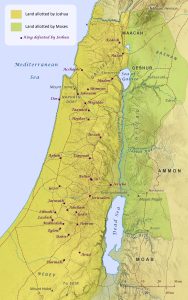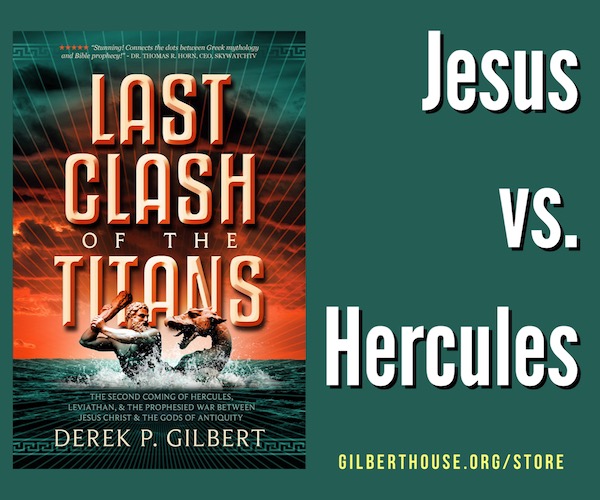Even though Og, last of the (living) Rephaim, was dead, his allies, the Anakim, were important enough that their utter destruction was Joshua’s main objective in the conquest of Canaan. Remember, the Anakim were specifically linked to the Rephaim by Moses:
Do not harass Moab or contend with them in battle, for I will not give you any of their land for a possession, because I have given Ar to the people of Lot for a possession.’ (The Emim formerly lived there, a people great and many, and tall as the Anakim. Like the Anakim they are also counted as Rephaim, but the Moabites call them Emim.… And when you approach the territory of the people of Ammon, do not harass them or contend with them, for I will not give you any of the land of the people of Ammon as a possession, because I have given it to the sons of Lot for a possession.’ (It is also counted as a land of Rephaim. Rephaim formerly lived there—but the Ammonites call them Zamzummim—a people great and many, and tall as the Anakim; but the Lord destroyed them before the Ammonites, and they dispossessed them and settled in their place.
Deuteronomy 2:9b–11, 19–21, ESV; emphasis added
While the Book of Joshua goes into some detail about his campaigns against all the “—ites” (Canaanites, Amorites, Hittites, Perizzites, Jebusites, etc.), when it summarizes the result of the war, the Anakim are singled out for special mention:
And Joshua came at that time and cut off the Anakim from the hill country, from Hebron, from Debir, from Anab, and from all the hill country of Judah, and from all the hill country of Israel. Joshua devoted them to destruction with their cities. There was none of the Anakim left in the land of the people of Israel. Only in Gaza, in Gath, and in Ashdod did some remain. So Joshua took the whole land, according to all that the Lord had spoken to Moses. And Joshua gave it for an inheritance to Israel according to their tribal allotments. And the land had rest from war.
Joshua 11:21–23, ESV
In short, Joshua’s conquest of Canaan was a war against the giants. Taking out Og, last of the Rephaim, was the first objective, and the war in Canaan was focused on “cutting off” the Anakim. Remember, according to the spies Moses sent into the land, the Anakim were unusually large:
The land, through which we have gone to spy it out, is a land that devours its inhabitants, and all the people that we saw in it are of great height. And there we saw the Nephilim (the sons of Anak, who come from the Nephilim), and we seemed to ourselves like grasshoppers, and so we seemed to them.
Numbers 13:32b–33, ESV; emphasis added
That may be the reason for their size—the Anakim came from the Nephilim.
Now, our view on the Anakim has changed a bit since we first wrote this piece in 2017. The Anakim may have been unusually tall compared to the Israelites, who averaged about 5’4″ during the Iron Age. But the phrase translated “descendants of Anak” (Num. 13:28), yelide ha-anaq, does not mean literal blood descendant of Anak. Rather, yelide refers to those who belong to a group into which they’ve been initiated or consecrated–like a cult.
And Anak, contrary to what you may have heard, does not derive from a Hebrew word meaning “long-necked.” It’s actually a loanword from archaic Greek, anax, a noun with four meanings: “the gods, Homeric heroes, the master of the house and ship masters.” [1] In Homer’s Iliad, the high king of the Greeks, Agamemnon, was the anax, while lesser kings like Odysseus and Achilles were basileis. In the pantheon, Zeus was the anax, king of the gods.
In other words, the “descendants of Anak,” Hebrew yelide ha-anaq, means something like “devotees of the king.” The Anakim were not genetic descendants of the Nephilim, but an association or cult that venerated the anax, which in Canaan could have been Zeus (the Greek form of Baal) or the creator-god El.
And as we’ve learned since writing this piece, the link between Canaan and the proto-Greeks goes back at least to the time of Jacob. The Hivites of the Bible were Greek: Hebrew ḥivî probably derives from Hiyawa, a Luwian (south Anatolian) form of Ahhiyawa, the Hittite name for the Achaeans, who were the Mycenaean Greeks in Homer’s epic poems Iliad and Odyssey. [2]

There are some who debate this passage, trying to erase the giants from the Bible by arguing that the spies lied, and that’s what is meant by their “bad report.” In fact, some English translations lean toward that reading of the text, preferring “false report,” “rumors,” or “lies” to describe their assessment of the enemy.
But that would the Egyptians were also lying about giants in the land. At least two Egyptian texts that we know of mention people of unusual size, the Shasu, in the land of Canaan.
Please understand, we’re not claiming that monsters thirty feet tall roamed Canaan in the days of Moses. But when you’re 5′4″, the average height of an Iron Age Israelite, a guy big enough to play professional basketball looks like a giant–especially when he’s pointing the business end of a spear at you. The important point is not their height, it’s that the Anakim, Rephaim, and their Amorite allies had spiritual connections to the Nephilim and their fathers, the Watchers.
Backing up a step: Did you notice the phrase, “devoted to destruction,” in Joshua 11:21? That’s translated from the Hebrew word kherem. It’s used a lot in Joshua, especially chapters 10 and 11, but you find it twenty-nine times in the Old Testament. It essentially means someone or something that must be destroyed because it’s taboo, under the ban, or spiritually contaminated.[3]
So, the people and goods that were “devoted to destruction” by Joshua and the Israelites were condemned, offered as a sort of sacrifice to Yahweh. Why? Maybe the better question is, “Who?” Who did God declare kherem, devoted to absolute destruction? Well, not the Israelites’ cousins in Edom, Moab, and Ammon. Even though the later prophets had harsh words from Yahweh about the descendants of Esau and Lot, God declared that they were not to be touched during the conquest of Canaan.
Likewise, Joshua was free to make treaties and spare the lives of citizens from cities far away. But God was explicit in His instructions to Moses about what was to happen to those in Canaan, and why:
But in the cities of these peoples that the LORD your God is giving you for an inheritance, you shall save alive nothing that breathes, but you shall devote them to complete destruction, the Hittites and the Amorites, the Canaanites and the Perizzites, the Hivites and the Jebusites, as the LORD your God has commanded, that they may not teach you to do according to all their abominable practices that they have done for their gods, and so you sin against the LORD your God.
Deuteronomy 20:16–20, ESV; emphasis added
That’s the reason. The people occupying Canaan were sold out to rebel gods and had been drawn into “abominable practices.” Such as? Sacrificing children to gods of the underworld was just one of their crimes. Read through Leviticus and Deuteronomy sometime, but don’t read them out loud with children in the room.
It’s hard for us in the twenty-first-century, especially in the postmodern West, to understand why God commanded Israel to wage a war of extermination against the Amorites and Anakim. We’ve lost the sense of gravity that this spiritual conflict deserves. Somewhere along the way, we’ve forgotten that we’re in the middle of a war for control ofeternity.
Joshua understood it. Did the Israelites fighting for him? Some, probably. Others, like Achan, son of Carmi, did not. In Joshua 7, we read that after the destruction of Jericho, Achan couldn’t resist helping himself to a fine cloak from Sumer, two hundred shekels of silver (about five pounds), and a gold bar weighing fifty shekels (about twenty ounces, worth more than $26,000 at the time of this writing!). Because of his sin, the army of Israel was routed by a much smaller force at the city of Ai.
When God revealed the presence of “devoted things” in the Israelite camp, the punishment was severe. Achan, his wife, their sons and daughters, and his livestock were stoned and then burned with the stolen goods. Why so harsh? Because, according to God, the mere presence of devoted things in the camp meant that the Israelites themselves had “become devoted to destruction.”[4]
That’s how serious this is. Be glad we’re not asked to fight that way today. We don’t have to, because Jesus did it on the cross.
But before He went to Calvary, Jesus, like Joshua, did battle with giants.
[1] E. C. B. MacLaurin, “Anak/ʾανξ.” Vetus Testamentum, Vol. 15, Fasc. 4 (Oct., 1965), p. 472.
[2] Billie Jean Collins, “the Bible, the Hittites, and the Construction of the ‘other’.” In Tabularia Hethaeorum: Hethitologische Beiträge Silvin Košak zum 65. Geburtstag. Dresdner Beiträgezur Hethitologie 25 (Wiesbaden: Harrasowitz, 2007), p. 154.
[3] Malul, M. (1999). Taboo. In K. van der Toorn, B. Becking, & P. W. van der Horst (Eds.), Dictionary of Deities and Demons in the Bible (2nd extensively rev. ed.), (Leiden; Boston; Köln; Grand Rapids, MI; Cambridge: Brill; Eerdmans), p. 826.
[4] See Joshua 7:10–26.


Thanku! I just read these chapters this morning with questions to God to understand the harshness – complete destruction of men, women, children, animals etc and then came across your study which gave me greater understanding
Thank you for the lesson!